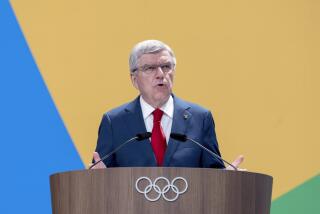Manchester Makes Credible Bid to Host Olympic Games in 2000
- Share via
MANCHESTER, England — Just the name of the place is enough to evoke a feeling of dreariness and gloom. Manchester, England, is where the Industrial Revolution was born; a place whose mere mention conjures leaden skies, red-brick factories and towering chimneys belching black smoke. Eight years ago, when a few Manchester notables first started talking about a bid for the Olympic Games, everybody laughed.
But as the International Olympic Committee prepares next week to pick the site of the Games for the year 2000, what once was a joke has turned into a real -- if slender -- possibility.
Many of Manchester’s factories were converted long ago into hotels and office buildings. For decades, the smokestacks have been smokeless. And quietly, the city has gone about the business of assembling an Olympic bid so credible that the unthinkable now seems no worse than a moderate long shot.
“The feedback we’re getting on the bid is that we don’t seem to have made any mistakes,” said Fran Toms, a spokeswoman for Manchester 2000, the Olympics bid committee. “We feel the thing now is mainly not to do anything wrong.”
For Manchester to get the Games, the two leading contenders, Beijing and Sydney, essentially would have to cancel out each other.
The IOC would have to decide that Thursday’s reports that the Chinese were to conduct underground nuclear weapons testing and the Chinese government’s previous record on human rights was enough to eliminate Beijing, and that hassles involving time zones and television coverage were enough to rule out Sydney.
Under this scenario, the consensus third-place candidate -- Manchester -- would slip in. Other original contenders -- Istanbul, Berlin and Brasilia -- are hardly mentioned in the competition.
Bob Scott, the theatrical impresario and civic booster who heads Manchester 2000, says he believes the odds of Manchester landing the bid are getting better every day. But he is also realistic.
“Manchester’s problem, of course, is image, our industrial Victorian backdrop versus the glamour of Sydney harbor,” he said. “But I really think all three bidders have weaknesses. It’s a matter of who can disguise their weaknesses best.”
That Manchester could gain a spot among the final three is little short of amazing. Even if the city loses, say Scott and others, the bid will have brought enormous gains in infrastructure, and, more important, in self-image. Mancunians, as residents of the city are called, actually have started to believe in themselves again.
“It doesn’t mean a damn whether we get the Olympic Games or not. That isn’t the point,” said Jim Ramsbottom, a local bookmaker, real-estate developer and restaurateur. “The important thing is that we’re trying to bring about a cultural change in the way we look at the city.”
In its 19th-century heyday, Manchester was workshop to the world-filthy, chaotic and an incredible generator of wealth. But by the end of World War II, the cotton mills and other factories that had made the city great were in serious decline.
For decades now, Manchester has been undergoing a painful transition from being one of the world’s greatest industrial centers to being a medium-sized, post-industrial city in search of a new role.
The Olympic bid, say boosters, has helped in that search. “We have very deliberately known all the way along that this is a race well worth entering and losing,” Scott said.
Manchester made a lackluster bid for the 1996 Games, and then set out to learn from its mistakes. This time, the bid is so well-organized that even rivals have been complimentary. “Manchester’s is a very good bid.
Two projects that would become major Olympic venues are already under construction, a 20,000-seat indoor arena that will be Europe’s largest and a state-of-the-art velodrome for cycling events.
Still unbuilt are the Olympic Stadium and Olympic Village, both of which would be located in an old warehouse district that just five years ago was an urban wasteland. The village, incorporating some renovated warehouses, afterward would be used as student housing.
One thing the organizers of the bid have not been able to improve is Manchester’s generally dreary weather. On an overcast day, with puddles underfoot and a damp chill in the air, Manchester does little to uplift the human spirit.
Manchester 2000 makes much of the fact that the city gets less rain in July, on average, than Sydney does in September (when the Games would be held if the IOC takes the Down Under option). But the rain in Sydney pours down and then stops, giving way to bright antipodal sunshine, while Manchester’s takes the form of a steady drizzle that can last for days.
Bring a brolly.
More to Read
Go beyond the scoreboard
Get the latest on L.A.'s teams in the daily Sports Report newsletter.
You may occasionally receive promotional content from the Los Angeles Times.






